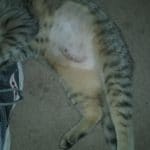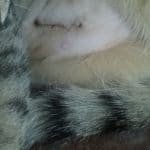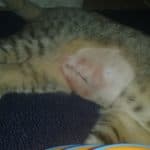Hello,
I am away from the office and on vacation.. but even if I wasn’t I would be very afraid that she might be blocked (unable to pass urine) versus having an infection or inflammation. If she is blocked she will need immediate assistance from a veterinarian. She may even need sedation or anesthesia to place a catheter. Certainly blockage is more common in males but we can’t assume she isn’t in an immediate medical emergency and that’s why we all get so worried about assuming it’s not something dangerous or life threatening and just prescribing blindly. Anytime a cat is in the litter box frequently and not producing much or any urine we worry about blockage.
As you are a client of the clinic I will have someone call you tomorrow to discuss options. But to be on the safe side I have to strongly recommend she be seen. And I cannot even assure you that tomorrow is safe to wait for.
I wish you all well and I hope she is ok. Please pm us on Facebook for private assistance.
Sincerely
Krista.
I just had my 5 month old kitten spayed on Friday Dec 13, 2019. On Sunday there was a good amount of bruising. Today is Thursday and day 6 of recovery and there is a bump a little smaller than a ping pong ball that is under the stitch line. Does this look like it is just a fluid sac or do you think a hernia? She runs, jumps, is and has been very active, eats, pee, poop, everything else is normal. I push on it and no reaction from her, there is no fever to it either.
First picture is the bump on day 6. Second picture is her stitches on day 6 of healing. Third picture is what her belly looked like on Day 2 and 3 after spay.
Comments
Hi Dr Magnifico. Our once feral cat Daisy has been going to her litter box all day every 2-5 minutes trying to urinate. Only a small drop or two comes out. She looks like she is in pain. We brought her in a couple years ago for this. She is extremely hard to get in a carrier or trap to bring her in and she is untouchable, she is still very feral like.
Can you prescibe the same thing she was prescibed before? I am going to have a very hard time getting her in a carrier or trap to bring her in, and she needs medication ASAP.
Terri Stiffler
Comments
My dog was Originally prescribed Gabapentin (50mg) every 12 hours but when I went back to the vet they allowed Me to do every 6 hours instead because pain seemed to be coming back faster. Now it seems the pain meds are not helping at all even with putting him to sleep. Can I give it even sooner than every 6 hours? My dog is 8.10 lbs.
Comments
I have a 12 year old female cat. She was obese for several years. I managed to get weight off of her a few months before these issues. There has been a lot of urination outside of the box. The urination has been going on a long time and initially I thought it was behavior because I adopted a rescue dog in October 2018 she hasn’t been thrilled about the dog. Right around the time my cat turned 12 she started with the urination… February or March.
In the last couple of weeks her thirst increased significantly. Also just laying on her side on the floor, not wanting to be in her bed or on the furniture. She’s losing weight /muscle mass and she is hoarse. She is still eating, I had to coax her a bit one day so I made chicken broth from drumsticks she’s been drinking a good amount of the broth and ate chicken and her canned food. She’s actually been gulping the food down.
I can’t tell if this is kidney related or diabetes. I have not noticed bad breath. I am in a real bind and need to figure out what else to do for her till I can get money for a vet.
Comments
Does congestive heart failure lead to seizures in dogs?
Comments
We believe our 3 year old French bulldog has IVDD related issue based on the exam at the emergency vet tonight.
We want to do everything we can as soon as we can. I spoke to a neurologist who said they won’t see him until he is referred by his primary vet. Just within the last 8 hours of this happening it appears he has loss all use of his hind legs. I’m not quite sure if this sign of paralysis or what I should be looking for. He is panting quite a bit from the pain so I’m assuming the paralysis hasn’t kicked in. We were given two prescriptions to follow through with until we can get him into a doctor on Monday. Is this going to be soon enough? We have pet insurance but also want to be sure it will cover the cost of the surgery if needed.
Comments
My cat got a FLUTD diagnosis yesterday morning after spending the night in the animal hospital because they were checking for an obstruction. He hadn’t obstructed, but they couldn’t get enough urine for a urinalysis, so when we picked him up yesterday morning they gave us a container. I got a hair under 3ml, dropped it off and was told they’d run it and let me know if it was enough but I have yet to hear if anything has come from it. He’s on an anti-inflammatory and a muscle relaxant. He’s a very vocal and clingy cat, but he’s been very quiet since we brought him home. He produced a decent amount of urine yesterday, but he hasn’t done more than a little dribble for about 4 hours now. I was told, if there were no additional or worsening symptoms, to bring him in immediately if this reaches 12 hours with no output. He doesn’t yell or talk or grunt when he’s in the litter, just stays there for a while and scrunches his back up as he tries to go but can’t, and will turn around frequently. He’s walking normally and isn’t having trouble getting to sleep, he’s eating normally and drinking frequently.
I was advised to start a vet prescription diet made up of 90% Hills Science Metabolic Urinary Care + CD dry food and 10% wet food, but the vets didn’t have any and after making a few calls around, was told my best option was to order it online and wait. Waiting is very stressful, and I’d really like to know if there is anything else I can do in the meantime to prevent any further discomfort or an obstruction. I would also like to know if there is a safe way to get him to the animal hospital the fastest. I’m worried if he’s obstructed, picking him up and carrying him or putting him in his cage might cause even more pain or make his urethra rupture.
Any additional tips or advice is very much appreciated. Thank you for your time.
Comments
Hello! I just discovered this app via a YouTube video, as I now spend my days googling things like “Cat breathing loudly” and “normal cat breathing”…!
Since perhaps June I’ve noticed with increasing regularity my cat, Clover, breathing very loudly, sometimes to the point of waking me up with the sound. In September this progressed and my husband noticed her breathing freakishly fast and we rushed to a vet.
However 5 vets, including a specialist, many xrays, and treatment for gum disease later, no one seems to know what it is, and I can’t take the wait and see method they are prescribing. She is playing and eating and otherwise normal, but her breathing does seem to bother and annoy her and at times she looks very despondent.
The history is that almost two years ago I made the most terrible judgement call of my life and she got out the window of a new apartment and fell 4 floors. She was unable to use her back legs for a few days during which they kept her under observation and she needed stitches in her soft palate. She has made an almost complete recovery.
The accident happened exactly a week after our other cat contracted an unknown disease and died suddenly and shockingly at aged 5. I still haven’t recovered from our other cat’s passing and both my husband and I comfortably acknowledge that Clover is the number one love in my life, and I will do everything to keep her alive and happy. However we have reached our pet insurance limit and I am so concerned about what will be next.
I have done all of the internet researching there is to be done, and I just know looking at her and hearing her stressful breathing that something is very wrong. I don’t know if it’s connected to the fall, but it isn’t bronchitis or asthma both of which treatments did less than nothing.
If anyone has any advice or had a cat with similar symptoms please let me know what you think?!
Comments
I have a 14 month old pit mix that has terrible anxiety. He is terrified of being by himself, even if we are just behind the closed door using the bathroom. He cries terribly & will pace the house until we’re done. If I take a shower or bath I leave the door open so he feels a little better, but he then cries & tries to grab my arm to pull me out (not in an aggressive way). When people come into the house he paces, jumps, & whines for them. He also does this outside when he sees people or other dogs. He is told “down” when he jumps & warned with the beeping noise on his training collar. He will sit but it is very hard for him to stay still, as he continues to whine, shakes, & then rolls into the ground. It’s like he knows to listen & tries very hard but literally can not stay still. He also is terrified of thunder & the sound the trash truck makes. When those sounds are occurring he runs right under the table & won’t come out. We are in the process of training & we were told by them that they also think he has anxiety. They think he would be able to comprehend better if it was under control. I have been researching non stop for things to help with this major issue. I don’t want him on prescription anxiety meds that cause him to seem “sedated” & not like himself (that happened with my family dog). I have come across a tablet to help with separation anxiety & the behaviors that come with it. It is called clomicalm & every review or story I have read about it was positive. I really do think this could be a successful choice for him IF I know this is something that is not harmful. There are possible side effects that could occur but that could happen with pretty much any medication humans or pets. This tablet does not cause dogs to seem drowsy from what I’ve read from people’s experiences & has a high success rate to treat anxiety. We have tried natural treats, oils, thunder vests, etc. & nothing has helped him in the slightest bit. I just want to know if this something that would be okay for him to take daily or even okay to take at all?
Comments
I have a two year old male yellow lab that has already had two obstruction surgeries. Both of these, Scout stopped eating and drinking and was vomiting. Last week we believe he ate a sock in which he has been eating on and off, he is drinking, peeing and is pooping. He wakes up every morning wagging his tail and is in good spirits, just lacking some energy on the days he doesn’t eat. He weighed 80 pounds on his previous checkup, yesterday we took him to our local vet, he weighed 70 lbs. The performed an x ray on him and said they believe it was a soft material that he swallowed and couldn’t determine if it was in his intestine or in his colon. While at the vet Scout was wagging his tail, holding the leash in his mouth as he usually does and ate about 20 treats. My vet charged me $360 and told me they recommend me to go to the animal hospital for an ultrasound to get a better idea of where this sock is located. I waited for 4 hours for them to tell me that they performed the ultrasound, it was somewhat inconclusive, his colon was enlarged and recommended exploratory surgery. I requested we wait to see if he will pass this. They kept him overnight, asked for an $800 deposit and called this morning saying that he was the same, and took x-rays to say it hasn’t moved. Your thoughts, suggestions or advice?












Hello,
Lots of kittens get some mild localized swelling at the incision site. But there is a little more bruising than I think is normal. I’m not particularly overly concerned if she is acting completely normal (eating, drinking peeing, pooping and active happy), but, I always always think it is best for the vet who did the surgery check any questions or concerns the pet parent might have. If you are a JVC client please let me know and I will have someone check tomorrow. Or i am happy to check on Sunday (open 1-3). We don’t charge for our own post op rechecks. Sincerely
Dr magnifico.
That bruising is gone now, it was there on day 2 and 3 then started to fade away. I am calling my VET in the morning to check and see if they think she should come in or just wait and see if it goes away. I am in VA so I am not a client of JVC but I do have an outstanding VET who sees all my fur babies and did this surgery. She is just the first kitten who is this light in color so the bruising was shocking at first, and the energy she has is crazy. I have had one other female that I adopted before she was spayed but she was calm and the older cat we had did not mess with her during healing. This little spit fire I have now won’t slow down and our older cat and her love to chase, stalk, and rough house with each other so its been a rough time keeping them apart. My boys were easy as the incisions are smaller and healing was faster. I think she has a Seroma as its squishy and no pain when I push on it. I would guess a hernia would hurt and slow her down a lot due to pain.
Hello!
Sounds good. Please let us know what the vet says. Happy holidays!